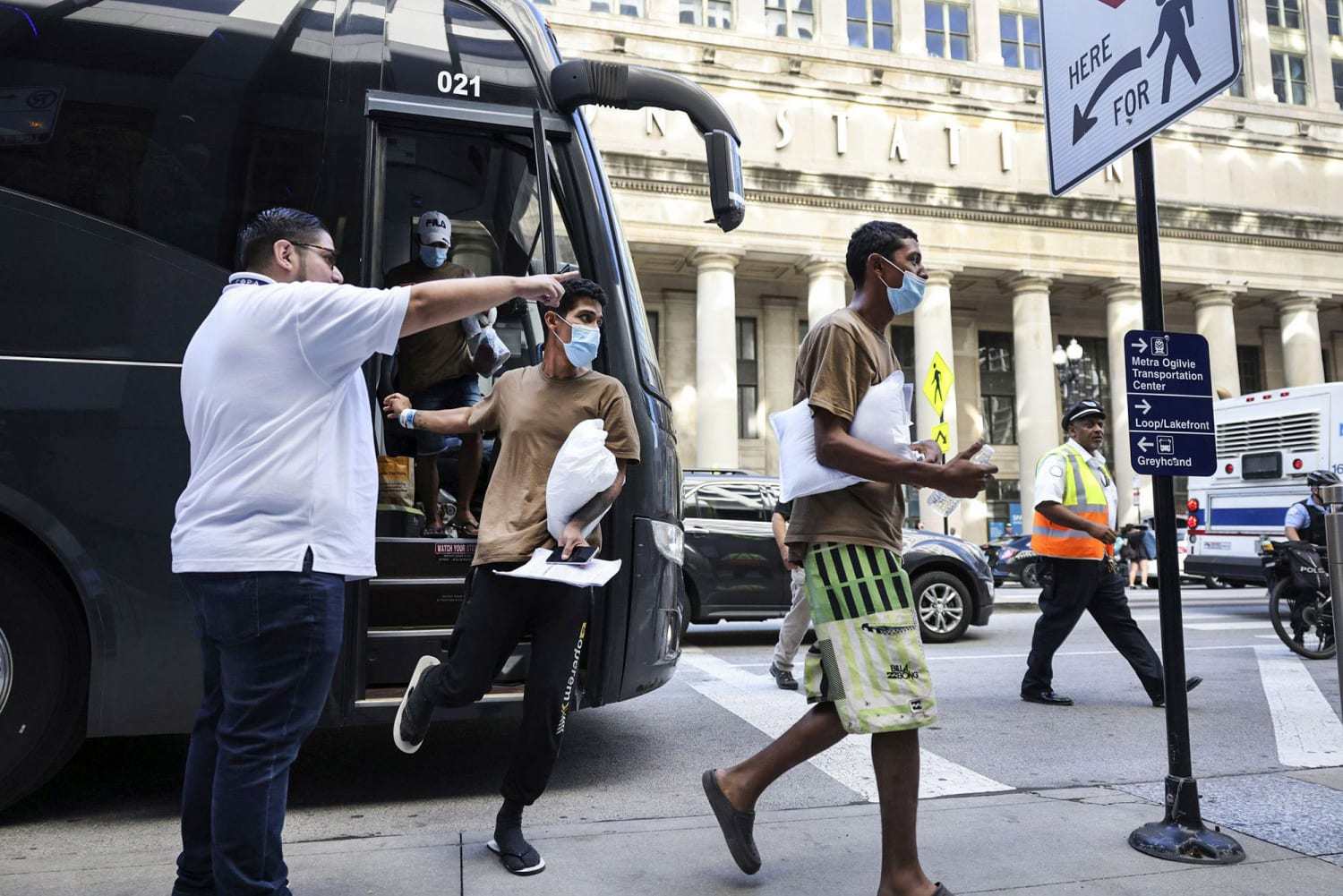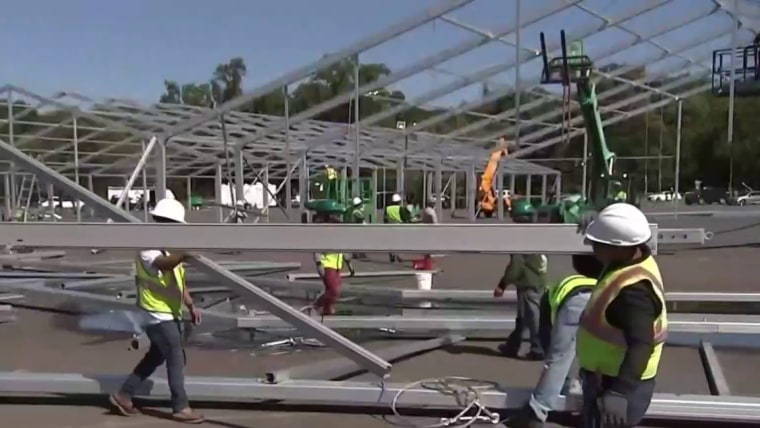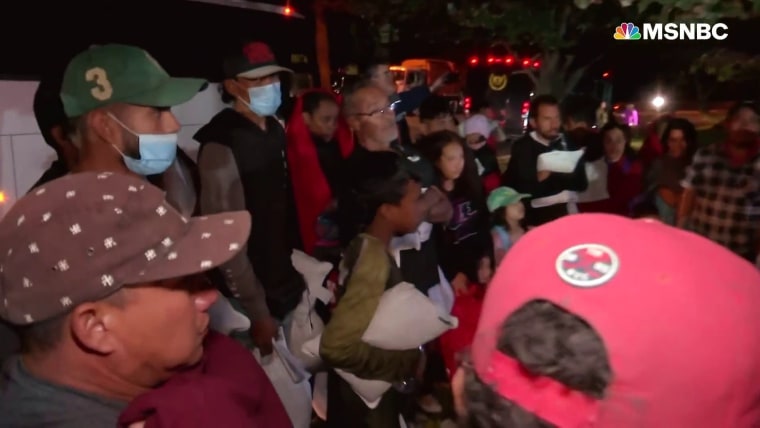CHICAGO — As migrants continue to be bused into the city, advocacy groups that have been working with the undocumented community say the city still has to fill many structural holes to support and sustain not only the new arrivals but also the existing undocumented community.
Since August, Texas Gov. Greg Abbott has sent more than 2,500 migrants to Chicago. While city and state leaders initiated a rapid response to situate the migrants, immigration activists and organizations still feel that efforts to shore up social services amount to emergency triage, not long-term solutions, and that these temporary measures don’t take into account the thousands of undocumented people already struggling to live in Chicago.
The city has set up temporary housing in shelters and hotels and a central reception center where the bused migrants can connect with relatives and access medical and legal help and family services as part of an immediate response. The city said in a statement Friday that every individual is provided with not only shelter, food and medical care but also “in-depth case management and connections to services.”
Mayor Lori Lightfoot has promised to welcome and help situate the migrants with open arms. “The city is actively working on solutions with our county and state partners to identify temporary housing and provide services that will lead to eventual resettlement in Chicago or elsewhere,” a mayoral spokesperson said in a statement.
But questions still remain on how that resettlement will take place as the city has historically not provided publicly funded programs that provide housing or long-term resources for undocumented people outside of recent and likely temporary pandemic-related relief.
“I still see this as a very temporary, not really structured, long-lasting type of support, so that kind of worries me,” said Xanat Sobrevilla, coalition and campaign coordinator with Organized Communities Against Deportations, a local advocacy group for undocumented immigrants. “Immediate hotel support and organizations that are putting their efforts in supplementing resources at the moment won’t result in structural changes to housing accessibility or things that we need for support long term like work permits.”
The city has nearly 829,000 noncitizens who are potentially at risk of deportation, according to 2016 data from the Vera Institute of Justice, a criminal justice nonprofit.
There is still a lack of housing and a complicated, long process for work permits has created an existing class of vulnerable undocumented people who are having to double and triple up in apartments and work illegally, she said. There has to be “some recognition that this has been something that’s been neglected and continues to be neglected,” she said.
A migrant who came to Chicago from Honduras in 2018 said she “wasn’t informed about anything — absolutely nothing” when she arrived, including how to find work and legal help for her asylum case. She asked to not be identified out of fear of retaliation while her immigration case is ongoing.
“When you arrive, they tell you that you do not have permission to work in the U.S. But how are you supposed to support your family?” she said. “People come here disoriented. They don’t know what to do. People arrive here, and they don’t know what’s happening.”
Being undocumented, she said, has caused her to be taken advantage of and she’s often paid much less for jobs that others might be paid more for.
“They say Chicago is one of the cities that welcomes migrants. Well, it’s the moment to demonstrate that,” the migrant said.
The need for more support
Merced Alday came to Chicago as an undocumented migrant in 1994 and is just now applying for legal status because she was scared that the process would affect her family back in Mexico.
Alday, who spoke in Spanish with her daughter Alexandra Moreno translating, said she lived in a small home with her brother and three other families for many years after she arrived.
That’s a common reality for many migrants who are waiting for legal cases, she said. She recalled not having much support or guidance upon arrival and feels the situation isn’t much different than it was nearly 30 years ago.
“We all still have the same problems that will keep happening,” she said, referring to people being forced to double and triple up due to a lack of stable housing.
Alday questioned why the incoming migrants were being offered so much assistance and why the city wasn’t also reaching out to those who’ve been there struggling to navigate the system for years.
It is unclear if the centers are open to migrants who are unrelated to the Texas buses.
It’s vital for city leaders to engage those who have been in the city without legal status to get a true understanding of the landscape and current infrastructure to ensure long term plans for the new migrants are comprehensive, said Luis Sinchi, the education organizer at Communities United, a racial justice organization that works with the undocumented community.
Sinchi said migrant families with whom he’s worked frequently have to rely on family or personal networks in order to find jobs or living arrangements, and without that support, he has seen people end up having to live on the streets. If there was some stable infrastructure for housing and long-term resources in place for asylum-seekers, this would help the larger undocumented community, as well.
“It goes back to engaging the community and listening to the people’s struggles,” he said. “Policies from 40 years or 50 years ago perhaps don’t reflect or it doesn’t apply to the needs or problems that are happening right now.”
While housing stability and work authorization have been aspects the undocumented community has fought for decades, the recent attention could provide the momentum needed to push the issues to action, said Brandon Lee, communications coordinator with the Illinois Coalition for Immigrant and Refugee Rights.
“In terms of being more powerful together, this is like a moment where we can advocate for something that meets the needs of many people, not only the people who are just arriving,” he said.
The state of Illinois and the city have historically invested in services for folks who are undocumented, Lee said, and that has come about because communities have demanded it.
Still in triage
In August, Chicago became the latest U.S. city to receive bused migrants, following similar arrivals in Washington, D.C., and New York City.
Those cities quickly became overburdened by the surprise inflow from Texas. On Friday, New York Mayor Eric Adams declared a city emergency over the “humanitarian crisis” of thousands of asylum-seekers coming to the city and slammed Texas Gov. Greg Abbott for exacerbating the issue.
Even though Chicago had some time to prepare, there was still “disarray” as buses arrived, said Sylvia Puente, president and CEO of the Latino Policy Forum, a nonprofit that works on public policy for Latinos in Chicago and Illinois.
“We’re just getting out of the eye of the hurricane. We still have to figure out how the dust settles and how we resolve this and how we move forward,” she said.
Puente said the city has historically been welcoming for asylum-seekers through a network of private organizations set up to offer aid, but there wasn’t enough infrastructure in place to handle an immediate burst of thousands.
In the days since the arrivals, Lightfoot, the Chicago mayor, has pleaded for more state and federal resources.
Last month, Illinois Gov. J.B. Pritzker issued a disaster proclamation to “unlock resources” to assist asylum-seekers and deployed 75 National Guard members to help with the logistics of receiving migrants.
The Illinois Emergency Management Agency has also established a unified area command center in Chicago to quickly deploy resources to support the operations under the governor’s direction, a mayoral spokesperson in a statement.
“There is no emergency infrastructure in place, it’s being created by building and flying the plane at the same time,” she said.
“It’s nascent and evolving and I think the leadership structure and how we move forward will get a little bit more solidified in the coming weeks.”
Source: | This article originally belongs to Nbcnews.com











